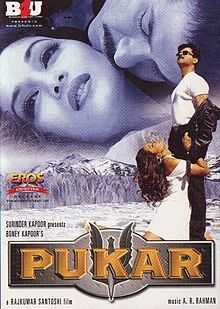Pukar (2000 film)
| Pukar | |
|---|---|
 DVD | |
| Directed by | Rajkumar Santoshi |
| Produced by | Surinder Kapoor |
| Screenplay by | Rajkumar Santoshi |
| Story by | Rajkumar Santoshi |
| Starring |
Anil Kapoor Madhuri Dixit Namrata Shirodkar Danny Denzongpa Om Puri |
| Music by | A. R. Rahman |
| Cinematography |
Ashok Mehta Santosh Sivan Baba Azmi |
| Editing by | V. N. Mayekar |
| Release dates | February 11, 2000 |
| Country | India |
| Language | Hindi |
Pukar (English: Call) is a Hindi drama film directed by Rajkumar Santoshi and starring Anil Kapoor, Madhuri Dixit, Namrata Shirodkar, Danny Denzongpa and Om Puri. The film was critically acclaimed and was a big hit at box office.[1] It won two National Film Awards, including the Nargis Dutt Award for Best Feature Film on National Integration and the National Film Award for Best Actor for Anil Kapoor's performance.
Plot
Major Jaidev Rajvansh (Anil Kapoor) and his fellow officer manage to rescue a leading politician as well as capture his kidnapper, Abhrush (Danny Denzongpa). The terrorist has been wanted for years and he is finally captured by the two officers. Jai returns to a joyous welcome and is declared a national hero. He takes a break from the army and returns to his hometown. There he meets his childhood friend Anjali (Madhuri Dixit) who has always harboured love for Jai. Anjali wants to make most of Jai's holiday and tries to get close to him and spend time with him as much as she can.
At a party, he meets the then Miss India, Pooja Mallapa (Namrata Shirodkar). As they spend more time together, they begin to fall in love. In the mean time, Jai's parents are arranging his marriage to Anjali but when they find out about Jai's love for Pooja, they realise that they have to tell Anjali everything. Anjali, heartbroken and jealous wants revenge as Jai rejected her. Realising her frustration with Jai, Abrush takes advantage (via the said "kidnapped" politician who is hand in glove with Abrush) and together they plot to destroy Jai's reputation and life.
Anjali manages to steal certain important secret documents detailing plans for Abrush's movement from prison to prison. The following events lead to Jai being court martialed and he is declared a traitor to the country. Pooja leaves him alone due to family pressure. Jai, determined to prove his innocence and redeem himself, decides to pursue Abrush alone. Ultimately Anjali comes to her senses and realises her mistake. To atone for it, she single-handedly tries to thwart Abhrush's plans and help Jai prove his innocence. Jai overpowers Abhrush. Finally Jai expresses his love for Anjali and forgives her and both unite.
Cast
- Anil Kapoor as Major Jaidev Rajvansh
- Madhuri Dixit as Anjali
- Sudhir Joshi as Anjali's Father
- Namrata Shirodkar as Pooja Mallapa
- Om Puri as Colonel Hussein
- Danny Denzongpa as Abhrush
- Kulbhushan Kharbanda
- Shivaji Satam as Col. Rana
- Farida Jalal as Gayetri Rajvansh
- Rohini Hattangadi as Mrs. Mallapa (Pooja's Mother)
- Girish Karnad as Mr. Rajvansh
- Govind Namdeo as Mr. Mishra
- Anjan Srivastava as Mishra's Assistant
- Mukesh Rishi as Bakshi, Abhrush Assistant
- Yashpal Sharma as Major Katar Singh
- K.D Chandran
- Viju Khote as Dayanand Awasthi
- Neeraj Vora
- Prabhu Deva as Himself in song, "Kay Sera Sera"
- Lata Mangeshkar as Herself in song, "Ek Tu Hi Bharosa"
Soundtrack
| Pukar | ||||
|---|---|---|---|---|
 | ||||
| Soundtrack album by A. R. Rahman | ||||
| Released | 1999 (India) | |||
| Recorded | Panchathan Record Inn | |||
| Genre | Film Soundtrack | |||
| Label | Venus | |||
| Producer | A.R. Rahman | |||
| A. R. Rahman chronology | ||||
| ||||
The music is given by A.R.Rahman while the lyrics are written by Majrooh, Javed Akhtar.
- The song "Kay Sera Sera", was a remake of the song "Kadhal Nayagara" from a Tamil movie En Swasa Kaatre. The lyrics of that song and the title is from Que Sera, Sera (Whatever Will Be, Will Be).
- Rahman reused the song "Oh Bosnia" as "Ek Tu Hi Bharosa". The song was composed and performed by Rahman in his Malaysian concert in 1996 that was in aid of Bosnian victims. The piano was played by Rahman himself.
Tracklist
| Song | Artist(s) |
|---|---|
| "Kay Sera Sera" | Shankar Mahadevan, Kavita Krishnamurthy, Swarnalatha |
| "Sunta Hai Mera Khuda" | Udit Narayan, Kavita Krishnamurthy, Swarnalatha |
| "Humrahi Jab Ho Mastana" | Hema Sardesai, Udit Narayan |
| "Hai Jaana - 1" | Sujatha |
| "Hai Jaana - 2" | Sujatha |
| "Kismat Se Tum" | Anuradha Paudwal, Sonu Nigam |
| "Ek Tu Hi Bharosa" | Lata Mangeshkar |
Awards
Pukar received many awards and nominations, the most important being Anil Kapoor who won the National Film Award for Best Actor for his performance.
Nominated:
Nominated:
|
Nominated:
Won:
|
References
External links
- Pukar at the Internet Movie Database
| |||||||||||
| |||||||||||